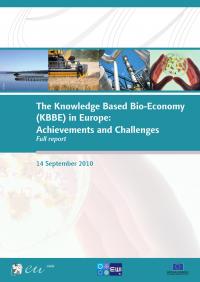Gedaan met laden. U bevindt zich op: The Knowledge Based Bio-Economy (KBBE) in Europe: achievements and challenges
The Knowledge Based Bio-Economy (KBBE) in Europe: achievements and challenges
The increasing demand for a sustainable supply of food, raw materials and fuels, together
with recent scientific progress, is the major economic driving force behind growth of the
Knowledge Based Bio-economy (KBBE) in Europe over the last few decades. The bioeconomy
– the sustainable production and conversion of biomass, for a range of food,
health, fibre and industrial products and energy, where renewable biomass encompasses
any biological material to be used as raw material - can play an important role in both
creating economic growth, and in formulating effective responses to pressing global
challenges. In this way it contributes to a smarter, more sustainable and inclusive
economy.
It is estimated that the European bio-economy currently has an approximate market size
of over 2 trillion Euro, employing around 21.5 million people, with prospects for further
growth looking more than promising. In addition to being economically favourable, the
KBBE can help to meet the most urgent global challenges improving public well-being in
general. Areas that it can benefit include social and demographic development and its
impact on agriculture, the growing pressure on water, the threat of climate change, the
limited resources of fossil fuel, the need for sustainable development, the impact of
changes in lifestyles and eating habits, the demand for safer and healthier foods and the
prevention of epizootic and zoonotic diseases.

Lees de publicatie
- Publicatiedatum
- September 2010
- Publicatietype
- Studie
- Thema's
- Wetenschap en innovatie , Economie en ondernemen